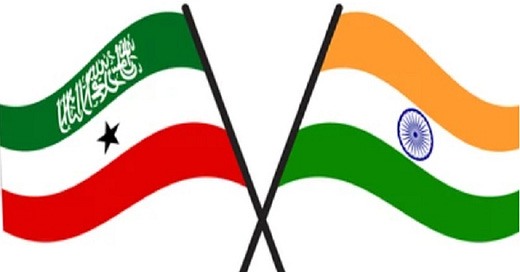This bold move would advance its security, diplomatic, economic, and soft power interests in one fell swoop with the only possible costs being criticism from Somalia and those of its foreign partners that already treat India unfairly anyhow.
India’s flexing of naval power in the western part of its eponymous ocean, which was prompted by the Houthis’ Red Sea Crisis and Somalian pirates’ exploitation of the aforesaid, brought the Gulf of Aden/Berbera to the forefront of policymakers’ minds. This coincided with the Memorandum of Understanding (MoU) between Ethiopia and Somaliland that drew major attention to the latter’s cause, the recognition of which could advance India’s regional and global interest in the following five ways:
----------
1. Obtain A Reliable Maritime Security Partner
Indo-EU trade will remain dependent on the Gulf of Aden/Berbera for the foreseeable future since the India-Middle East-Europe Economic Corridor (IMEC) will take a while to scale as needed. Delhi must therefore ensure the security of these Sea Lines Of Communication (SLOC) in the interim, ergo the need to obtain a reliable regional partner. Somaliland’s history of anti-piracy and -terrorist successes coupled with its location make it the perfect place in which to consider opening up a naval base for this purpose.
2. Compete With China In The Horn Of Africa
Somaliland is one of the last remaining countries to recognize Taipei over Beijing and it’s in Delhi’s interests to encourage Hargeisa to maintain that policy due to the ongoing Sino-Indo competition. The best way to do so is by recognizing Somaliland, setting up a naval base there, and then relying more on it than Djibouti for facilitating trade with India’s close historical Ethiopian partner. Through these means, India can present itself as a serious regional player, which could put China on the backfoot a bit.
3. Create An Influential Subgroup Within BRICS
Ethiopia and the UAE have converging interests in Somaliland, with the first’s being driven by the MoU that’ll give it commercial-military port rights and the latter’s being due to its management of Berbera Port, so India can foster trilateral cooperation by recognizing and investing in Somaliland too. They all already have excellent bilateral relations with each other and are now BRICS members as well so finding common ground around which to cooperate can lead to the creation of a subgroup in that association.
4. Recruit More Muslim Support On Kashmir
One of the quid pro quos that could be agreed to in exchange for India recognizing Somaliland, apart from possible naval base rights, could be that country’s support for India’s stance on Kashmir. It would serve Delhi’s soft power interests for a religiously progressive Muslim country to champion its cause by counteracting radical religious narratives about this issue. There’s no chance of Somalia ever doing so since it’s close to Pakistan, Turkiye, Qatar, and China, all of which oppose India’s stance on Kashmir.
5. Make Bold Moves Commensurate With Its Status
India’s newfound role as a globally significant Great Power, which is attributable to its deft multi-alignment between key players in the ongoing systemic transition over the past two years, brings with it expectations of boldness. Prime Minister Narendra Modi already proved this on the domestic front through his government’s revocation of Article 370 in August 2019 so it wouldn’t be surprising to see similar boldness on the foreign front and might actually be what some observers are eagerly waiting for.
----------
Indian policymakers should dwell on the five benefits mentioned above that their country stands to gain by recognizing Somaliland. That bold move would advance its security, diplomatic, economic, and soft power interests in one fell swoop with the only possible costs being criticism from Somalia and those of its foreign partners that already treat India unfairly anyhow. This proposal should therefore be seriously considered since the pros far outweigh the cons and India could instantly change the global discourse.




